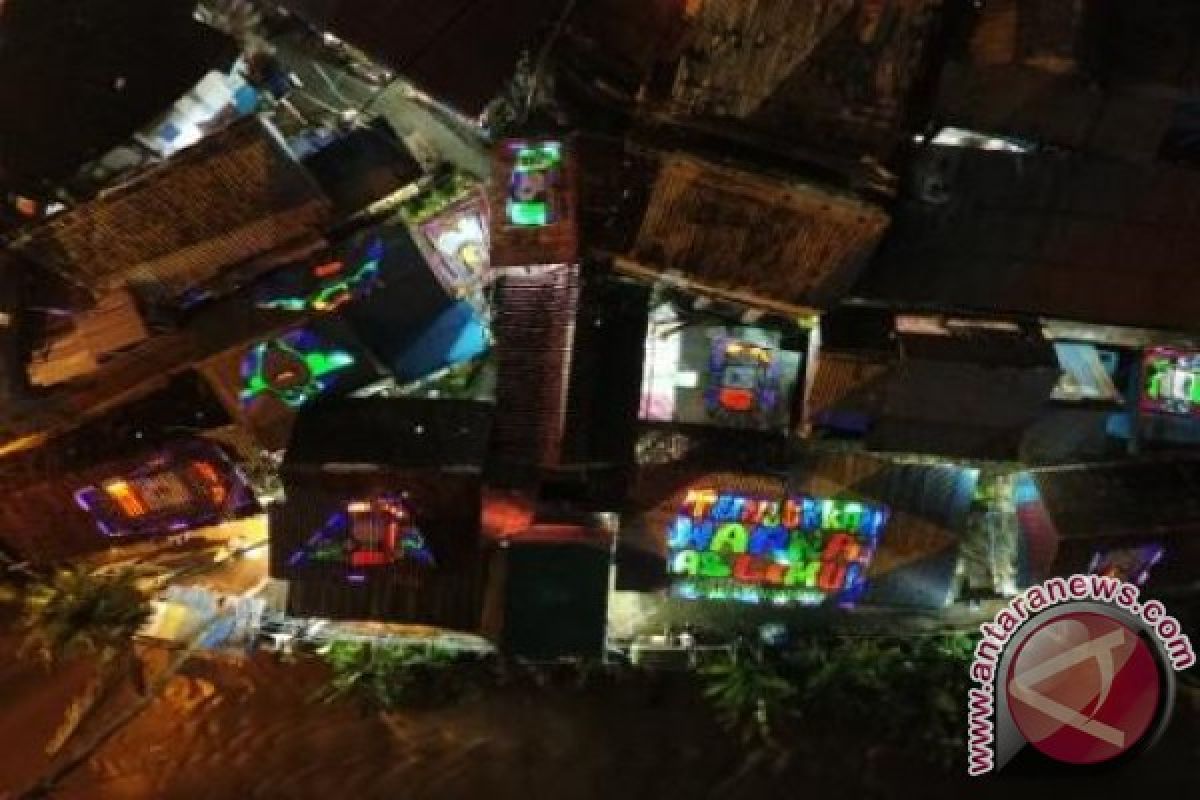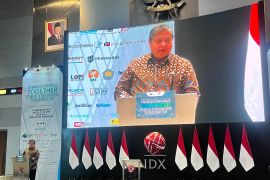The new anti-tobacco images are painted in a special paint which is luminescent under ultraviolet lights, ensuring they are as impactful at night as they are during the day. The images are also painted on rooftops, to be more easily viewed from a heavily-used bridge close to the village.
The "Show Your True Colors" project was accompanied by a video advocacy workshop, attended by 15 participants including Kali Code villagers, whose videos on living healthily and living healthy lives without smoking are being aired in an open air cinema in Yogyakarta on Saturday February 4th. Students from the University of Technology of Sydney (UTS) joined health advocates and Kali Code villagers to help to deliver the project. Every step was documented by video camera, DSLR, and drone and this footage will be shared over social media using the #SuaraTanpaRokok ("Smoke-free voices") hashtag and posted to the www.suaratanparokok.co.id website. And today, Feb 4th, hashtag #SuaraTanpaRokok was no 1 Trending Topic on twitter for 2 hours long.
Representatives from Muhammadiyah University of Yogyakarta (UMY), Muhammadiyah Tobacco Control Centre (MTCC), Kali Code community (RT/RW), and Koma all spoke at today's unveiling ceremony in Yogyakarta.
Commenting at the event, Koma said: "Art is hugely powerful in its ability to convey important messages that people can connect to, emotionally. This project has been a real example of public art being used for the public good - and it has brought Muslims and Christians together, working side by side. I have been honoured to participate in the Show Your True Colors project. I encourage all Indonesians to look at the fantastic work of the team here in Kali Code - and to listen to their vitally important message."
Dianita Sugiyo, Vice Chairman of MTCC said: "We have been working in Yogyakarta for the past year and it is clear that people believe the tobacco industry should not be permitted to act with impunity. A survey found that 84 percent of residents either agree or strongly agree that they want to live in an environment free from tobacco ads. This project and the accompanying education activities are empowering the local community. They have acted to remove the tobacco industry's branding from Kali Code and we expect Yogyakarta, especially Kali Code, will be free from tobacco ads in the future."
Jose Luis Castro, President and Chief Executive Officer of Vital Strategies, said: "It's particularly appropriate that the unveiling of this project occurs on World Cancer Day. Many current and potential tobacco users in Indonesia are at greater risk of developing cancer related to their tobacco use, so tobacco control messages need to be prominent. The tobacco industry exploited the Kali Code villagers. For more than a year now, it has used their homes to catch the attention of the many people who travel in that area - especially the young people who socialize at the bridge which provides a perfect vantage point to see Kali Code. These are the industry's real targets - the young people it needs to prop up its sales and profits while its older customers die from tobacco-related diseases. Now, the villagers have been empowered to reclaim their village. They have decided to challenge the tobacco industry by letting these anti-tobacco messages take center stage around their homes. And we applaud them for it. Kali Code is showing that it's possible to stand up to the tobacco industry and stand for a better, healthier future free from tobacco industry exploitation."
Footage and images of the project are available upon request.
Tobacco's deadly cost to Indonesia
According to The Tobacco Atlas, more than 2,677,000 children and 53,767,000 adults use tobacco in Indonesia (57.1 percent of men, 3.6 percent of women, 41 percent of boys and 3.5 percent of girls). The proportion of men, boys and girls who use tobacco is higher in Indonesia than in other middle income countries. Tobacco kills 217,400 Indonesians every year and in 2010, it was the cause of 19.8 percent of deaths among adult men and 8.1 percent of deaths among adult women - higher than the average in other middle income countries. Studies indicate that Indonesian males are initiating tobacco use at younger and younger ages - many as early as twelve years old. Tobacco use is the leading risk factor for non-communicable diseases, which could cost Indonesia's economy as much as US$4.5 trillion from 2012 to 2030, according to the World Economic Forum.
About Vital Strategies
Vital Strategies is a global health organization that seeks to accelerate progress on the world's most pressing health problems. Our team combines evidence-based strategies with innovation to help develop and implement sound public health policies, manage programs efficiently, strengthen data systems, conduct research, and design strategic communication campaigns for policy and behavior change. To find out more, please visit www.vitalstrategies.org or Twitter @VitalStrat.
For further information or to arrange an interview with a Vital Strategies public health and tobacco control expert, please contact Tracey Johnston, Vital Strategies, at +44.7889.081.170 or tjohnston@vitalstrategies.org.
Reporter: PR Wire
Editor: PR Wire
Copyright © ANTARA 2017












